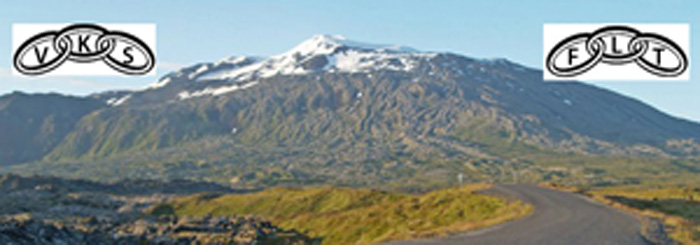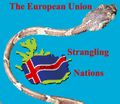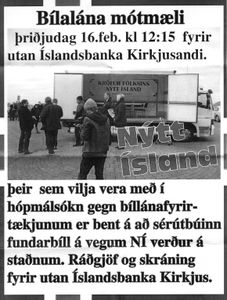Samtök lánþega safna áhugasömum í þeim tilgang að stofna til hópmálsókna á hendur bönkum og fjármögnunarfyrirtækjum vegna forsendubrests lánasamninga sem voru tryggðir með vísitölu og / eða erlendri mynt.
ÉG VERÐ MEÐ ! EN HVAÐ ÆTLAR ÞÚ AÐ GERA?
Slóð til að fræðast um málið og skrá sig: http://gandri.com/?p=1294
ÁFRAM ÍSLAND, NEI við ESB - NEI við ICESAVE - NEI við AGS !!!Kjaramál | 17.9.2010 | 16:20 | Slóð | Facebook | Athugasemdir (0)
Ég sótti þennan bækling em er hér neðst í þessari færslu á heimasíðu ESB (http://ec.europa.eu/enlargement/pdf/key_documents/2007/understanding_enlargement_102007_en.pdf)
og breytti í MS-Word skjal. (PDF skjalið er viðhengi)
Ég biðst afsökunar á því að efnisyfirlit og blaðsíðutal hefur ruglast en þetta ætti samt að skiljast.
Með því að fara á þessa síðu: http://ec.europa.eu/enlargement/er hægt að finna frekari upplýsingar og þá ætti líka að verða ljóst hverjum heilvita manni að Ísland fær engar sérstakar ívilnanir varðandi fiskimið eða annað nema þá í mjög skamman tíma. Í þessu sambandi er ég sérstaklega að benda á 'The chapters of the Acquis' http://ec.europa.eu/enlargement/archives/enlargement_process/future_prospects/negotiations/eu10_bulgaria_romania/chapters/index_en.htmÞar segir ma.; "...And these rules (also known as "acquis", French for "that which has been agreed") are not negotiable..." Einnig hér: http://ec.europa.eu/enlargement/glossary/terms/acquis_en.htm
Munð að fyrir eitt eilífðar smáblóm sem ætlar að lifa í þúsund ár er þriggja til sjö ára undanþága aðeins augnablik í tilverunni.
NEI við ESB - NEI við Icesave - BURT með IMF
________________________________________
During half a century, the European Union has pursued ever-deeper integration while taking in new members. Most of the time, the two processes took place in parallel. As a consequence, today’s EU, with 27 Member States and a population of close to 500 million people, is much safer, more prosperous, stronger and more influential than the original European Economic Community of 50 years ago, with its 6 members and population of less than 200 million.
A growing membership has been part of the development of European integration right from the start. The debate about enlargement is as old as the EU itself. Every time the EU accepts new members, it changes. Thinking about what we might become forces us to think about what we are now, and what we want to be in the future.
The 2004 /2007 enlargement to countries from Central and Eastern Europe and the Mediterranean has proven a great success for the EU, although it has been used as a scapegoat for all sorts of social and economic problems in Europe. Actually, this last round of enlargement has expanded the area of peace, stability and democracy on our continent,and strengthened the European economy by enlarging markets, creating new business opportunities and bringing fast-growing economies into the single market. Now the EU is the world’s largest economic zone. The wider internal market and new economic opportunities have increased Europeans’ prosperity and competitiveness.
The democratically elected governments of the EU Member States, coming together in the European Council, have agreed that future enlargements will concern the countries already working towards EU membership -Croatia, the former Yugoslav Republic of Macedonia, Albania, Bosnia and Herzegovina, Montenegro, Serbia including Kosovo (under UN Security Council Resolution 1244) and Turkey. Membership will only happen when each one of them meets the necessary requirements. A gradual and carefully managed enlargement process creates a win-win situation for all countries concerned.
The purpose of this brochure is to explain, in a clear and concise way, what the EU’s enlargement policy is about and how it is put into practice. It aims to give the reader an overview of how the EU has grown since its creation, where it stands today after having undergone its most important round of enlargement in 2004/2007, and what the perspective of accepting new members in the future is. Above all, this publication intends to respond to frequently asked questions like, „Who decides?“ and „How does an aspirant become a Member State?“
I hope that reading this brochure will be both informative and easy, and that it will provide answers to your questions about EU enlargement.
Olli Rehn Member of the European Commission responsible for enlargement
A great deal of additional information on the European Union is available on the Internet. It can be accessed through the Europa server (http://europa.eu/). Information about the enlargement of the European Union can be found on the web site of the Directorate General for Enlargement (http://ec.europa.eu/enlargement/). Cataloguing data can be found at the end of this publication. ISBN 978-92-79-06636-8 European Commission, Directorate General for Enlargement, 2007 © European Communities 2007 Reproduction is authorised provided the source is acknowledged. Printed in Belgium
2
From 6 to 27 Member States ........................................................ 4
Who can join? ..............................................................6
Who decides? .........................................................8
The enlargement process at work: meeting the requirements ..................................... 9
Helping candidates preparing for membership ........................................................ 14
The future .......................................................... 16
Article 6 (1) of the Treaty of the European Union “The Union is founded on the principles of liberty, democracy, respect for human rights and fundamental freedoms, and the rule of law, principles which are common to the Member States.” Article 49 of the Treaty of the European Union “Any European State which respects the principles set out in Article 6(1)may apply to become a member of the Union.”
6
8
requirements
The chapters of the Acquis
1.1. Free movement of goods
Once the EU agrees a common position on each chapter of the acquis, and once the candidate accepts the EU’s common position, negotiations on that chapter are closed – but only provisionally. EU accession negotiations operate on the principle that “nothing is agreed until everything is agreed”, so definitive closure of chapters occurs only at the end of the entire negotiating process.
Reporting and monitoring
Monitoring continues until accession. This makes it possible to give additional guidance as countries assume the responsibilities of membership, and also guarantees to the current Member States that new entrants meet the conditions for accession.
Turkey 2006 Progress Report,
Chapter 25, “Science and
Research”
“Turkey’s research policy resulted in significant-
ly increased budgets for research and develop-
ment: nearly fivefold compared to 2002 levels.
New universities have been opened in 15 cities.
Improvements were also achieved in Turkey’s sci-
ence and research capacities including its grad-
ually more successful participation in FP6 [the
6th Framework Programme]. Turkey’s success
rate under FP6 improved and is now about 17%.
However, it is below the EU averages of about
20%. In terms of funding, Turkey was mostly
successful in obtaining small projects. However,
EU funding is not achieving its potential.
Taking into account actions that Turkey has tak-
en with respect to mobility of researchers, sci-
ence and society and 3% of GDP for Science
and Technology Action Plan measures, Turkey
is already well integrated into the European
Research Area.”
A candidate country’s progress towards the EU depends on how well it implements reforms needed to fulfil the accession criteria. The EU provides support to the countries in their preparations for EU accession.
The candidate countries’ formal links to the EU may be established in different agreements. For example, Turkey’s formal links with the EU are enshrined in an agreement first signed in 1963 (the “Ankara Agreement”), repeatedly updated since then, and in a Customs Union agreed in 1995. For the countries of the Western Balkans, a special process was established in 2000, called the Stabilization and Association Process (SAP). The SAP pursues three aims, namely stabilization and a swift transition to a market economy, the promotion of regional cooperation and the prospect of EU accession. It helps the countries of the region to build their capacity to adopt and implement European standards. In the framework of the SAP, the Union offers the countries of the Western Balkans trade concessions, contractual relations and economic and financial assistance. Since 1991, the EU has provided some €12 billion in assistance to the Western Balkans, some of the highest per capita assistance in the world. Candidate countries often need to carry out significant reforms to ensure that EU rules are not only adopted, but properly implemented too. They may have to set up new bodies, such as an independent competition authority, or a food-standards agency. Or they may need to restructure existing institutions: de-militarizing the police, upgrading environmental and nuclear-safety watchdogs, or giving prosecutors more autonomy in combating corruption. These reforms usually imply major investments in know-how and funds. The EU offers a wide range of complementary programmes and mechanisms to provide finance and technical assistance in carrying out these reforms. Aware of the challenges that reforms can present to citizens in candidate countries, the EU also promotes strategies to boost public understanding of the accession process, including dialogue between the EU countries and candidate countries at the level of civil society: trade unions, consumer associations and other non governmental organizations. An important aspect of the EU’s assistance is strengthening institutional capacity, or “institution building”, by developing the structures or training the staff responsible for applying EU rules in the candidate country. Advice on implementing the acquis is often provided via “Twinning” arrangements, in which experts are seconded from EU Member States, or through short-termworkshops. Preparing countries for membership can also mean helping them to upgrade their infrastructure: building solid-waste disposal plants or improving transport networks. Candidate countries are allowed to participate in EU programmes, for example in the areas of public health or research, and may also receive grants and loans from international financial institutions. This experience allows candidate countries to learn how to handle the kind of funding they will be entitled to after accession, also helping to familiarize them with EU policies and instruments. The EU has created a new financing instrument to fund its assistance to countries on their way to membership, including a range of incentives and conditions to ensure the best use of EU money. This single “Instrument for Pre-Accession Assistance” (IPA), in force since 1 January 2007, is a simplification of the EU’s previous wide range of support programmes, like Phare, CARDS or SAPARD. In particular, IPA will help strengthen democratic institutions and the rule of law, reform public administration, carry out economic reforms, promote respect for human as well as minority rights and gender equality, support the development of civil society and advance regional co-operation, and contribute to sustainable development and poverty reduction. For candidate countries, the additional objective is the adoption and implementation of the full requirements for membership. IPA will provide a total of €11,468 million at current prices over 2007–2013, with precise allocations decided year by year.
| Former Yugoslav Republic of Macedonia Indicative Financial Framework for the Instrument for Pre-Accession Assistance until 2010 (€ million, current prices) | ||||
| 2007 | 2008 | 2009 | 2010 | |
| Turkey | 497.2 | 538.7 | 566.4 | 653.7 |
| Croatia | 138.5 | 146.0 | 151.2 | 154.2 |
| Former Yugoslav Republic of Macedonia | 58.5 | 70.2 | 81.8 | 92.3 |
| Serbia | 186.7 | 190.9 | 194.8 | 198.7 |
| Montenegro | 31.4 | 32.6 | 33.3 | 34.0 |
| Kosovo | 68.3 | 64.7 | 66.1 | 67.3 |
| Bosnia and Herzegovina | 62.1 | 74.8 | 89.1 | 106.0 |
| Albania | 61.0 | 70.7 | 81.2 | 93.2 |
| Total | 1260.2 | 1383.3 | 1480.4 | 1621.7 |
The future
Future enlargements will concern the countries of south-eastern Europe. It is in the best interest of all of Europe to promote democratic transformation in the Western Balkan countries and Turkey and to consolidate stability. In December 2006, the European Council renewed its consensus on enlargement. The EU has taken the concerns of its citizens about the pace of enlargement seriously. Enlargement policy is based on consolidation. This means that the EU honors existing commitments towards countries already in the process, but is cautious about assuming any new commitments. Rigorous conditionality is applied to all candidate and potential candidate countries. Their possible dates of accession depend on their progress with political and economic reforms as well as compliance with the EU body of laws. Each country will be judged on its own merits.
16 For enlargement to be a success, it is essential to secure the support of citizens both in the EU Member States and in the candidate and potential candidate countries. It is important to better communicate the successes and challenges of enlargement, in order to gain public support and make growing together a common project. The accession of Bulgaria and Romania in January 2007 completed the EU’s fifth round of enlargement, which began in 2004 and increased the number of EU Member States from 15 to 27. There is no similar big enlargement wave ahead in the foreseeable future. The EU should continue to grow at a pace to be determined by its own citizens and the progress of candidate countries in fulfilling the requirements. The European Union’s nature is dynamic. Much has been achieved in recent years, and the journey continues. The Union is committed to keeping the negotiations on track. In the process of integrating new members, together we will work towards increasing prosperity and security while enhancing solidarity.
Both the EU and the countries involved stand to benefit from the transforming power of the process leading to accession.
The History of the Process
1957 Belgium, France, Germany, Italy, Luxembourg and the Netherlands sign the Treaty of Rome and establish the European Economic Community (EEC).
1963 Ankara Agreement signed with Turkey.
1973 Denmark, Ireland and the United Kingdom join the EC.
1981 Greece joins the EC.
1986 Spain and Portugal join the EC.
1987 Turkey applies to join the EC.
1990 Following reunification of Germany, integration of the former German Democratic Republic.
1993 Copenhagen European Council agrees the accession criteria.
1995 Austria, Finland and Sweden join the EU.
Customs Union with Turkey.
1999 Helsinki European Council confirms Turkey as a candidate country.
2000 The Zagreb summit confirms full commitment to the Stabilisation and Association Process by countries in the Western Balkans.
2003 Croatia applies to join the EU.
The Thessaloniki summit reaffirms the EU’s commitment to eventual integration into the Union of the countries of the Western Balkans.
2004 Cyprus, the Czech Republic, Estonia, Hungary, Latvia, Lithuania, Malta, Poland, Slovakia and Slovenia join the EU.
The former Yugoslav Republic of Macedonia applies to join the EU.
2005 Opening of accession negotiations with Turkey and Croatia.
Screening starts for Turkey and Croatia.
2006 Opening and provisional closure of the first chapter of negotiations with Croatia and Turkey.
2007 January: Bulgaria and Romania become EU Member States.
You will find more information on enlargement on the website of the Directorate General for Enlargement of the European Commission. http://ec.europa.eu/enlargement/
NI78-07-352-EN-C
Evrópumál | 29.8.2010 | 02:13 | Slóð | Facebook | Athugasemdir (0)
Hvernig stendur á því að bóta og lífeyrisþegar standa ekki saman og mynda þannig sterkt afl gegn niðurskurði og skattheimtu stjórnvalda.
 Gera aldraðir, svo dæmi sé tekið, sér grein fyrir því hvað þeir gætu myndað kröftugt afl stæðu þeir saman ásamt öðrum bóta og lífeyrisþegum og ynnu sem einn í stað þess að pukrast hver í sínu horni og skaða jafnvel hagsmuni hvers annars.
Gera aldraðir, svo dæmi sé tekið, sér grein fyrir því hvað þeir gætu myndað kröftugt afl stæðu þeir saman ásamt öðrum bóta og lífeyrisþegum og ynnu sem einn í stað þess að pukrast hver í sínu horni og skaða jafnvel hagsmuni hvers annars.
Skattmann og kompaní mættu þá fara að vara sig
LÁGMARKSFRAMFÆRSLA og fátækt á Íslandi, verður fundarefni á BORGARAFUNDI hjá BÓT - Ráðhúsi Reykjavíkur 8. sept. 2010 - kl. 20:00! BÓTVERJAR !!!
Bót, FaceBook hópur: http://www.facebook.com/isleifur.gislason?v=wall&story_fbid=142597465777247&ref=notif¬if_t=share_comment#!/group.php?gid=120279531356843&ref=mf
Stjórnmál og samfélag | 27.8.2010 | 23:02 | Slóð | Facebook | Athugasemdir (2)
Vinsælum bloggara, Lofti Altice Þorsteinssyni hefur verið meinaður aðgangur að Moggablogginu.
 Loftur hefur verið ötull talsmaður sjálfstæðis íslensku þjóðarinnar gegn atlögu ESB-sinna að fullveldi þjóðarinnar. Hann hefur einnig barist hart gegn Icesave kúguninni.
Loftur hefur verið ötull talsmaður sjálfstæðis íslensku þjóðarinnar gegn atlögu ESB-sinna að fullveldi þjóðarinnar. Hann hefur einnig barist hart gegn Icesave kúguninni.
Loftur er rökfastur maður og hefur með samböndum sínum hér og erlendis safnað ógrynni gagna til stuðnings málstað samherja sinna og birt hér á blogginu öllum þjóðhollum mönnum til aflestrar.
Eitthvað hafa stjórnendur moggabloggsins haft horn í síðu Lofts fyrir skoðanir sínar og notuðu ómerkilega átyllu til að úthýsa honum og skoðunum hans héðan.
Hér hefur átt sér stað ógeðsleg aðför að málfrelsi og skoðanafrelsi allra sem vilja tjá sig á þessu bloggsvæði.
Bloggar | 26.8.2010 | 01:18 (breytt 31.8.2010 kl. 18:04) | Slóð | Facebook | Athugasemdir (76)
Ný frétt:
Andres Zoran Ivanovic: "MIKILVÆGAR FRÉTTIR. Helga Björk Magnúsdóttir Grétudóttir var rétt áðan handtekin fyrir utan Stjórnaráðinu. Ástæðan var að hún gaf mávum að borða. Lögreglumennirnir voru ekki grófir, alla vega ekki fyrir framan myndavélina. Meira að segja þurftu þeir tveir bílar ein fyrir Helgu og Econoline fyrir hjólið hennar."
Andres Zoran Ivanovic: " Helga var að hringja. Hún verður ákærð og er henni sleppt núna. Hún er á leiðinni til Stjórnaráð aftur að gefa mávunum. Vinsamlegast dreifið þetta og komið svo þangað. bara best sem strax."
Stjórnmál og samfélag | 10.8.2010 | 13:11 | Slóð | Facebook | Athugasemdir (3)
Stjórnmál og samfélag | 9.8.2010 | 01:15 | Slóð | Facebook | Athugasemdir (0)
Í kvöld sat ég fund undir fundarstjórin Gústafs Skúlasonar. Þar voru tveir Breskir séntilmenn, Donald A. Martin og Anthony John Miller, og báðu þeir íslendinga afsökunnar á setningu hryðjuverkalaganna og lýstu um leið von sinni að við myndum alfarið hafna aild að ESB eins og við höfnuðu Icesave samningnum. Þeir sögðu okkur að 75% af lögum þeirra og reglugerðum væru nú samin í Brussel en að hjá €vruríkjunum væri það 80-90%.
Þeir kynntu líka merkilega áætlun sem stefnir að því að hefta heimildir bankanna til að búa til peninga úr engu. Peninga sem þeir síðan lána okkur og sökkva okkur smám saman í skuldafen sem við eigum enga möguleika að losna úr.
Við í Samtökum fullveldissinna munum skoða þessa áætlun vel með það í huga að nýta hana þjóðinni til framdráttar.
Þetta verður þungur róður í miklum mótbyr frá fjórflokknum og bönkunum sem þar stjórna.
Við þurfum ykkar stuðning!
ÁFRAM ÍSLAND
NEI við ESB - NEI við Icesave - NEI við AGS
Styðjum Samtök Fullveldissinna
http://www.fullvalda.is
http://fullvalda.blog.is/blog/fullvalda/
Stjórnmál og samfélag | 19.5.2010 | 01:42 | Slóð | Facebook | Athugasemdir (2)
Kjaramál | 13.2.2010 | 23:10 (breytt 14.2.2010 kl. 00:07) | Slóð | Facebook | Athugasemdir (3)
Kvennafrídagur 24 október 1975 var haldin til að leggja áherslu á kröfur kvenna um almennt jafnrétti kynjanna.
Nú er verið að brjóta á öllum íslendingum, með örfáum undantekningum, með því að ráðast að heimilum þeirra og henda fólkinu á götuna.
Ef kvennaverkfallið var nauðsynlegt 1975 er eitthvað minni þörf á baráttu í dag þegar peningavaldið með verkalýðsforkólfa lífeyrisjóðanna okkar í broddi fylkingar sækir að heimilunum í landinu konum körlum og börnum og tekur af þeim lifibrauðið með því að heimta endurgreiðslu okurlána?
Síðan þegar síðasta krónan er horfinn í lánahítina, svarthol lánastofnana sem soga allar eigur fólksins inn í sig, er gengið að heimilinu með valdi og fólk borið út niðurbrotið á sál og líkama.
Áðurnefndar undantekningar virðast vera sá hópur fólks sem kom hruni efanahags okkar af stað og vinnur nú að því að sölsa undir sig þær eigur og fyrirtæki sem bankarnir hafa í skjóli ríkistjórnarinnar tekið til varðveislu.
Það er komið nóg segi ég og legg til að gert verði allsherjarverkfall td. þann fyrsta maí næstkomandi. Verkfall þetta verði látið standa þar til ríkisstjórn Íslands setur þau lög sem duga til að knýja fjármálastofnanir landsins til að afnema verðtryggingu lána frá og með 1. janúar 2008 og til að breyta öllum gjaldeyristryggðum lánum í lán í íslenskum krónum miðað við sömu dagsetningu.
Að lokum skal bæta þeim skaðann sem þegar hafa verið settir á vergang og færa þeim heimili sín aftur ásamt miskabótum.
Hvað skyldi maður vera lengi að vinna upp vinnutap vegna verkfalls þegar kröfur okkar vinnast???
Kjaramál | 10.2.2010 | 23:11 | Slóð | Facebook | Athugasemdir (13)
"Á kjörseðli skal borin upp eftirfarandi spurning:
„Eiga lög nr. 1/2010, um breytingu á lögum nr. 96/2009, um heimild til handa fjármálaráðherra, fyrir hönd ríkissjóðs, til að ábyrgjast lán Tryggingarsjóðs innstæðueigenda og fjárfesta frá breska og hollenska ríkinu til að standa straum af greiðslum til innstæðueigenda hjá Landsbanka Íslands hf., sem Alþingi samþykkti en forseti synjaði staðfestingar, að halda gildi?“
Á kjörseðli skulu gefnir tveir möguleikar á svari: „Já, þau eiga að halda gildi“ eða „Nei, þau eiga að falla úr gildi"
Spurningin er fáranlega löng og flókin en ég hef náð að skilja hana og segi NEI !
Frumvarp um þjóðaratkvæðagreiðslu

|
Fundur hafinn á Alþingi |
| Tilkynna um óviðeigandi tengingu við frétt | |
Kjaramál | 8.1.2010 | 14:27 | Slóð | Facebook | Athugasemdir (10)


 EU Understanding Enlargement
EU Understanding Enlargement




